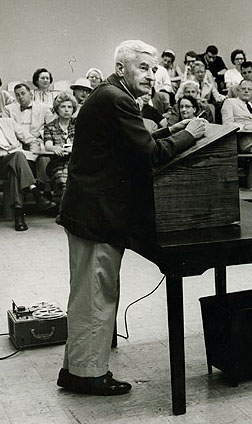Audio Clips
| CLOSE WINDOW TO RETURN TO MAP |

 Photograph by Ralph Thompson © Rector and Visitors, University of Virginia |
During the 1957 and 1958 Spring semesters, William Faulkner was the Writer-in-Residence at the University of Virginia. During that time he appeared at thirty-six different public events, reading from his work and answering over 1400 questions from students, faculty and others. Thanks to two members of the Department of English, Frederick Gwynn and Joseph Blotner, most of those sessions were recorded, and preserved on tape in the University of Virginia Special Collections Library. Over 28 hours of the recordings have been digitized, and are available online in the Faulkner at Virginia audio archive . The mp3 clips available below have been taken from that archive, and are playable on most devices. NOTE: Faulkner was not asked any questions specifically about "A Justice," but in the following clips he discusses his interest in and representation of Indians, either "Chickasaws" or "Choctaws"; he and his questioners seem to have treated the tribes as interchangeable.
Where did you get your information on the Chickasaws? (2 May 1958; 1:18) |
Where did you get your information on the Chickasaws? (2 May 1958; 1:18)
William Faulkner: Yes, ma'am.
Unidentified participant: Where did you find all your information on the Chickasaw Indians? Are there records [ . . . ]?
William Faulkner: Yes'm. There—there are records there, but I never did do much research. I would—I probably got my information about Indians as I've got it about most of the other things I know, from listening to people and adding a little imagination to it. I suspect that—that no Chickasaw would recognize my Chickasaws, [audience laughter] but people that do know more about Mississippi's history don't quarrel too much with my picture of Chickasaw Indians. And also, I have known some of their descendants. They have mixed with white people or with Negroes—are still in my country. And I don't think that—that people are all that different no matter what color they are. That people are different more because of the pressure of their environment than because of their blood.
Where did you get your interest in Indians? (12 May 1958; 1:03)
William Faulkner: Yes, sir.
Unidentified participant: Where did you personally get your—get your interest in Indians? Was it from relics or living near them in Mississippi or—?
William Faulkner: That's a part of—of my culture, my North Mississippi culture. Our country is—compared to the country east of the mountains is—is—was frontier only a hundred years ago. Remnants of Chickasaw families still live. They're still my neighbors. Some are—are—are mixed with Negroes. Others are mixed with white people. The traditions are still there. There—in my childhood, boyhood, there were old men that could remember having heard their fathers tell them about the old days. The Indian names are still on the creeks and branches. The old roads, the old hilltops, still have the Indian names with the tribal significance.
Are there still Indians in Mississippi? (15 February 1957; 0:31)
Joseph Blotner: [Do they exist just in memory now—]?
William Faulkner: There are a few. There's a reservation, a remnant of—of Choctaws. The others, the Indians in my part of Mississippi have vanished into the two races, either the white race or the Negro race. You see traces of the features in the Negroes and a few of the old names in—in among white families, old white families.
